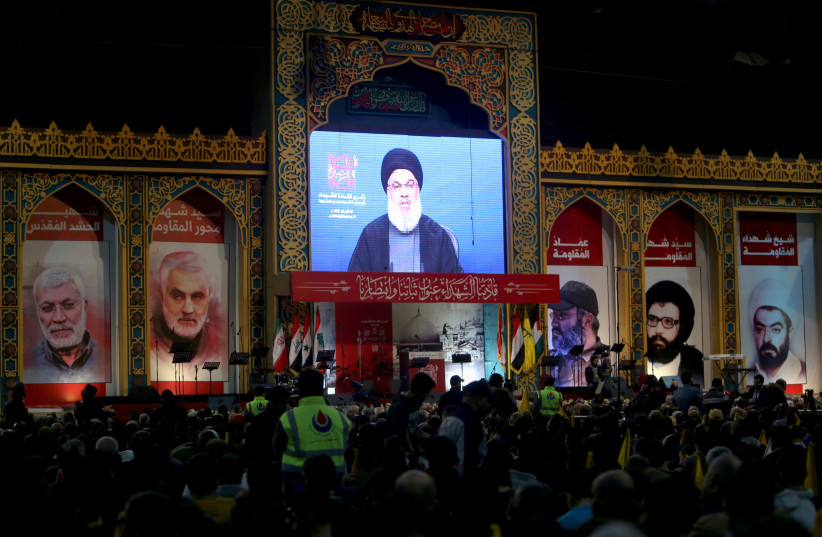Hezbollah leader urges greater links to China and a shift “eastward” away from the US.
SETH J. FRANTZMAN

Hezbollah leader Hassan Nasrallah slammed Israel’s annexation plan on Tuesday evening, claiming it is the most dangerous thing in the whole of the Middle East. He called for support for Palestinians and mocked the US, claiming Hezbollah was becoming stronger under the administration of US President Donald Trump.
Nasrallah pointed to success stories such as Venezuela, Cuba, Syria and North Korea as models for countries that resist the US attempt to “starve” people. The US has used sanctions to try to isolate the Syrian regime, destroying Syria’s economy. The US has also gone after Venezuela and Iran using various sanctions and methods. Hezbollah’s leader, who has spent most of the last decade and a half in a bunker since he launched a war on Israel in 2006, said the US was alienating allies.
Recently in Lebanon, pressure has been put on the US and its embassy. A judge attempted to stop the US ambassador from being interviewed and a US helicopter helped airlift Amer Fakhoury to safety after he was detained in Lebanon in March. “Americans, you must understand your policy won’t weaken Hezbollah, it will strengthen it,” Nasrallah said. His speech was translated in tweets by David Daoud, an expert, who live tweeted it.
Hezbollah provided its usual list of conspiracies to describe the region. Nasrallah claim ed the US was using Israel and “takfiris,” a reference to ISIS, against the “resistance” that Hezbollah offers. “The US commanded the 2006 Israeli war.” In fact, Nasrallah started that war. Nasrallah targeted the US Ambassador to Lebanon Dorothy Shea in his speech, telling her not to go on Lebanese TV. He called on Lebanese people to ‘arise and defend themselves against her behavior.” This appears to be a clear threat against the US embassy. In the 1980s Iranian-backed groups bombed the US embassy and a Marine barracks.
Hezbollah appears to be pushing for a crisis with the US by targeting the ambassador. Nasrallah has accused her of “inciting Lebanese parties.” He claimed the US has interfered in Lebanon, seeking to have certain appointments at the central bank. He called the US a “colonialist” country. “We saw ambassador Shea come to Lebanon, we welcomed here, but rather she has not adhered to diplomatic customs and is acting like a governor,” he said.
Nasrallah also delved into economics. He suggested that Lebanon’s economy is based on elites and luxury goods, tourism and bourgeoisie mentalities. He suggested the people must get back to the land and plant and turn the country to agriculture. He painted a picture of an agricultural pastoral Lebanon. He argued this would make the country self-sufficient and not force surrender to the US or others. He also suggested Lebanon buy fuel from Iran. Iran supports Hezbollah. He also praised Iraq, saying Lebanon could reach out to Iraq. Iraq is an ally of Iran.
Of lasting importance, Nasrallah also highlighted the importance of China. He said that the US was angry at the effectiveness of China. He argued for Chinese companies investing in Lebanon. It was time to initiative greater links with China. “We mustn’t fear America’s reactions.” The time to turn to the east had come. “We are not trying to impose the Iranian model or turn Lebanon communist. All we mean by turning eastward,” he said, was to accept offers from whoever will help.
This was an important speech that sketches out a desire to remove the US from Lebanon, reducing the ambassador’s role and connecting more with China. It is part of a larger shift in the Middle East away from the US as the US influence appears to decline in the region.
Content retrieved from: https://www.jpost.com/arab-israeli-conflict/nasrallah-urges-people-to-remember-palestine-amid-economic-crisis-634231?fbclid=IwAR1_-0KWrRfH1Sr7rGhppozDnhmJnPqQolg_meYu3EvW6QwxqQjRMao86DQ.